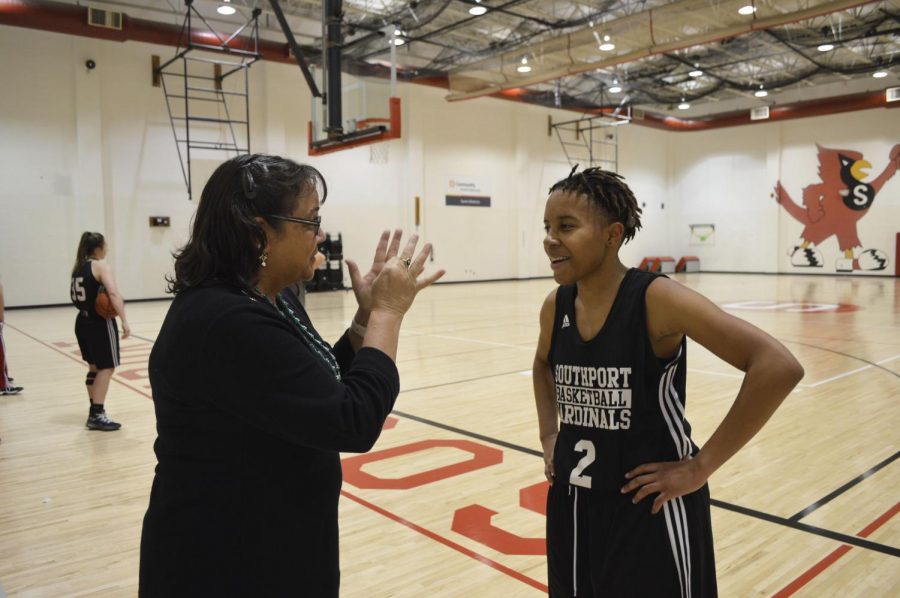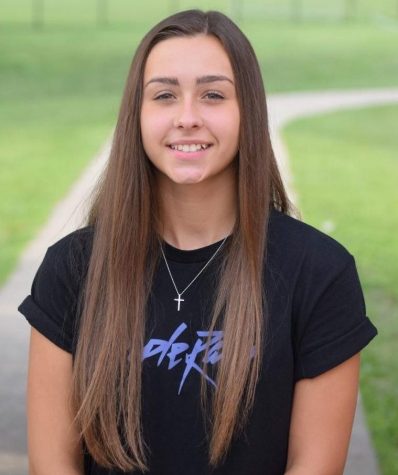Breaking the sound barrier
Junior Markayla Scott (right) signs with her interpreter, Patty Sorrell, at a practice on Dec. 12.
December 19, 2017
In the games that the girls level-three basketball team has played, Junior Markayla Scott has had trouble hearing the cheering of the fans, the whistle blowing, the buzzer going off or her teammates and coaches trying to communicate with her.
Scott is one of the handful of student athletes here at SHS who have to overcome the obstacle of not being able to hear the environment around them clearly.
“(I) can hear a little bit,” Scott said. “Like when a basketball hits the floor, I can hear that.”
Scott has an implanted hearing device in her head in order to help her be able to hear more efficiently. The device is called “Baha” which, according to the Hopkins Medicine website, is “a technology that combines a sound processor with a small titanium fixture implanted behind the ear.”
The device allows Scott’s interpreter or coach to communicate with her from afar by talking through a microphone that is connected directly to Scott’s device. Scott can hear everything that is spoken to her through the microphone clearly, and it helps her understand what is going on in games and practices.
According to Scott and her interpreter, Patty Sorrell, her teammates don’t just rely on Scott to read their lips or hear instructions through the microphone in order to communicate. When on the floor during a game, Scott’s teammates give her the sign for the play that they intend to call through sign language.
Freshman Natalie David, is a cheerleader here at SHS, and like Scott, her teammates have worked out system with her in order to help her stay in the loop as to what is going on.
According to SHS teacher of the deaf, Beth Cooper, David and the girls on the cheerleading squad have a tap system to where the person leading the chant taps on either their hip or lifts their leg so David knows when it’s the last time for a chant, or when the chant is about to begin.
“When they are doing chants, the girl in the front says, ‘Last time!’ and then she (David) can see the girl raise her foot, and she knows it’s the last time for that chant,” said Cooper.
Senior Brittany Fisher, who is deaf with cochlear implants, is a pitcher on the SHS softball team. Being a pitcher, Fisher has to look to the catcher for signals in order to know what kind of pitch she needs to throw next. Fisher says this is easier rather than having to hear it because she matches the number she sees with the intended pitch that needs to be thrown.
Even though all three of these student athlete’s hearing conditions cause them to stand out from the rest of their teammates, they are still incorporated in team activities and they have good relationships with one another.
“I have learned from them (her teammates) and they have learned from me as being a deaf person and being their teammate..,” Scott said. “I’m very happy and blessed that I have teammates that support me and treat me like family.”
Fisher says that she and her teammates have known each other for a long time, and that communication between them is good because she can read lips and ask them to repeat what they said until she understands.
Being unable to hear the world around you can create obstacles, but these student athletes make it work to where they can still be successful in the sports they play and even play on the collegiate level.
On November 29, Fisher signed her national letter of intent to play softball at Alfred State College in Alfred, New York.
Fisher believes that the communication between her and her new teammates at Alfred State will stay the same as it is at SHS because the head coach, Suzie DnNillo, is familiar with dealing with hearing loss.



